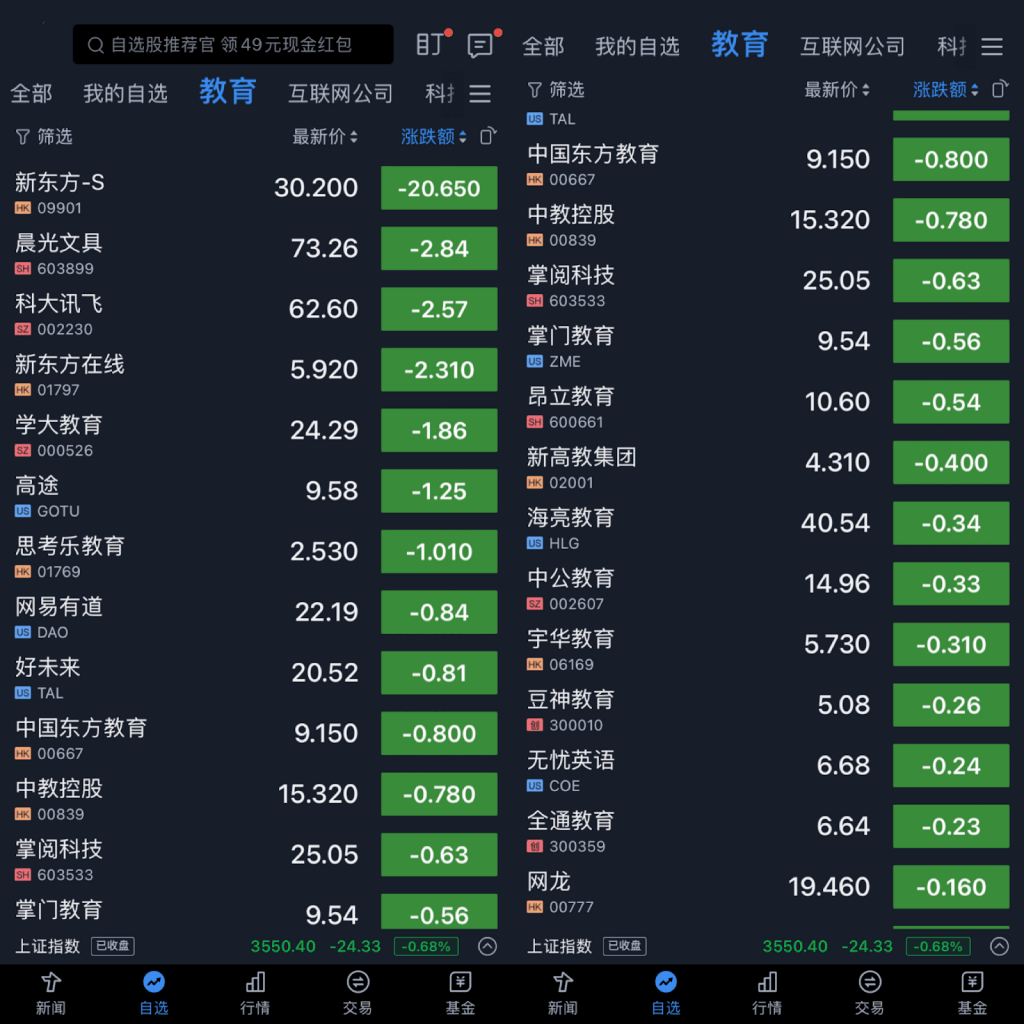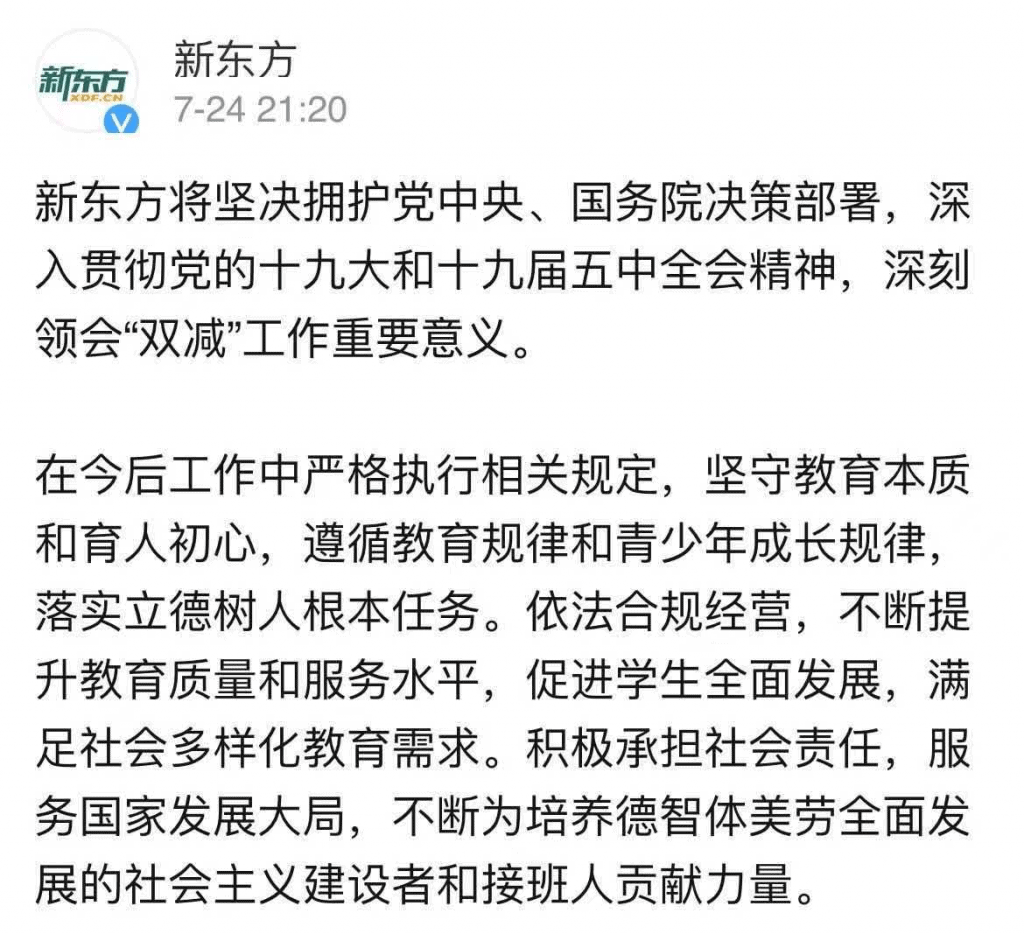End of an Era as China Puts an End to For-Profit Tutoring Companies
The new regulations include preventing IPOs, limiting workloads, and cracking down on deceptive ads.
On July 23, 2021 (Beijing), an internal government file titled “Opinions on Further Alleviating the Burden of Homework and After-School Tutoring for Students in Compulsory Education” spread through the internet, revealing new harsh regulations on Chinese education companies.
These regulations include:
- Preventing these companies from going public or being acquired.
- Forbidding foreign teachers outside mainland China from teaching.
- Prohibiting advertising and marketing.
A complete summary of the regulations can be found below.
Following the unverified news reveal, the stocks of almost all Chinese education companies went down, even though the regulations had not been made official as of July 23 (Beijing), 2021. In particular, the price of stocks of leading education companies plunged drastically.
The following day, China’s Ministry of Education formally announced the detailed regulations.
| Company | Feb 15, 2021 | July 22, 2021 | July 23, 2021 | Drop rate* |
| New Oriental Education & Technology Group Inc. (EDU) | $19.28 | $6.40 | $2.93 | -54.2% |
| TAL Education Group (TAL) | $90.15 | $20.52 | $6.00 | -70.8% |
| GSX Techedu Inc. (GOTU) | $103.27 | $9.57 | $3.52 | -63.2% |
| Youdao, Inc. (DAO) | $32.5 | $22.18 | $12.72 | -42.7% |
| China Online Education Group (COE) | $24.35 | $6.73 | $3.79 | -43.7% |
Since February, tutoring companies have been facing the prospect of new regulations and/or fines for deceptive marketing. This has led to stock price collapse, layoffs, and stopped IPO/Fundraising plans. Class Central previously reported on the $86 billion lost in market value. We also collected examples of deceptive marketing tactics employed by these companies.

Regulation Details
The “Opinion” regulates many aspects of Chinese education companies — from fundraising to advertisements, for both online and offline education companies — together with over 15 Chinese national bodies, including the Ministry of Education, the Cyberspace Administration of China, and The Ministry of Finance of the People’s Republic of China.
| Aspects | Regulations | Exam training | Non-exam training | ||
| Online | Offline | Online | Offline | ||
| Capitalization | Prohibit IPO | √ | √ | ||
| Prohibit public companies from investing or buying assets of exam training companies with stocks or cash | √ | √ | |||
| Prohibit foreign capitals from investing in exam training companies through mergers, acquisition, VIE structure,
entrusted management and franchise chain. |
√ | √ | |||
| Ask existing exam training companies for compulsory education to register as non-profit organizations. | √ | √ | |||
| Company approval | Stop approval of new exam training companies for K12 education | √ | √ | ||
| Stop approval of new training companies for preschool students | √ | √ | √ | √ | |
| Re-approve registered online exam training companies and cancel the original registration records and ICP license if not passing the approval. | √ | ||||
| Strengthen approval of non-exam training companies based on training type | √ | √ | |||
| Training content | Prohibit training for preschool students | √ | √ | √ | |
| Prohibit non-exam training companies from providing exam training services | √ | √ | |||
| Prohibit training content excess standardised difficulty | √ | √ | √ | √ | |
| Prohibit foreign courses | √ | √ | √ | √ | |
| Prohibit photo taking and answer searching services | √ | ||||
| Prohibit copyright infringement | √ | √ | √ | √ | |
| Training time | Prohibit training during weekends, holidays and summer/winter vacations | √ | √ | √ | √ |
| No more than 30 minutes/course, no later than 21:00 each day, no less than 10 minutes interval between courses | √ | √ | |||
| Training teachers | Prohibit hiring good teachers with high salaries from public schools | √ | √ | √ | √ |
| Should obtain government-verified teaching certificates and be disclosed on websites and in physical locations by education companies | √ | √ | |||
| Approve foreign teachers located in mainland China | √ | √ | √ | √ | |
| Prohibit foreign teachers located outside of mainland China | √ | √ | √ | √ | |
| Marketing | Prohibit expenses other than main business, like marketing | √ | √ | √ | √ |
| Prohibit monopolies | √ | √ | √ | √ | |
| Prohibit online and offline ads on social media, public places and residential areas from education companies | √ | √ | √ | √ | |
| Prohibit ads in primary schools and high schools, in text books, school uniforms, school buses, etc. | √ | √ | √ | √ | |
| Prohibit deceptive and misleading ads and promotions | √ | √ | √ | √ | |
| Tuition management | Set program prices based on demand and supply, supervised by the government | √ | √ | √ | √ |
| Make prices and standards public | √ | √ | √ | √ | |
| Manage pre-charge fee by third parties, and risk reserves supervised by the government | √ | √ | √ | √ | |
| Strengthen the supervision of loans from education companies | √ | √ | √ | √ | |
Responses of Chinese education companies and local ministries of education
On July 24, over 120 nation-wide education companies, including New Oriental Education & Technology Group Inc. (EDU), TAL Education Group (TAL), Youdao, Inc. (DAO), Gaotu Techedu Inc. (GOTU), Yuanfudao, Zuoyebang VIPKID responded to the “Opinion” with announcements on their official social media accounts.
“New Oriental will firmly support the decision and deployment of the Central Committee of the Communist Party of China and the State Council, thoroughly implement the spirit of the 19th National Congress of the Communist Party of China and the Fifth Plenary Session of the 19th Central Committee of the Communist Party of China, and deeply understand the significance of the ‘double reduction work”, New Oriental Education & Technology Group announced on July, 24.
By the end of July 26 (Beijing), New Oriental Education & Technology Group Inc (EDU) and New Oriental Education & Technology Group Inc. (9901.HK) had lost 27.8 billion USD and 239 billion HKD since February 19, 2021.

A special section called “Shuangjian “Double Reduction” in Action” has been established on the website of the Ministry of Education to promote the application of the new regulations. By the end of July 26 (Beijing), over 10 provinces had responded to the “Opinion” with provincial measures.
Tags







Dev
It’s interesting to see how quickly provinces are responding to the “Double Reduction” policy. The dedicated section on the Ministry of Education’s website shows the importance of these new regulations, and it will be worth following how they are implemented across different regions.